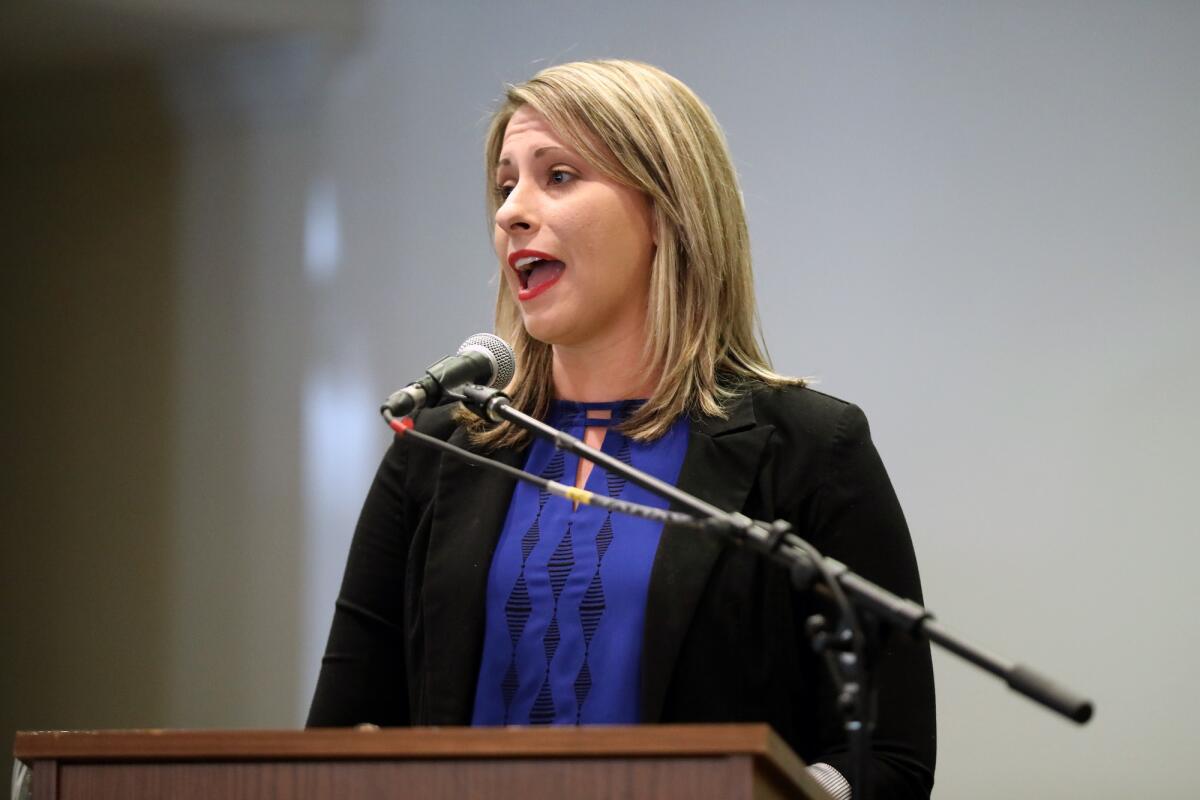Column: A year after resigning from Congress in a sex scandal, Katie Hill is back in the spotlight. Is anyone surprised?

- Share via
To no one’s surprise, Katie Hill is back.
The once-promising Democratic congresswoman from Santa Clarita — who turned a red district blue in 2018 but then resigned a year later after nude pictures of her and a female campaign aide were leaked to the media — never said that she would fade quietly into obscurity.
Quite the contrary. At the end of her farewell remarks on the House floor last October she said pointedly that she was yielding the balance of her speaking time “for now but not forever.”
And she wasn’t kidding. Ten months later she released a memoir. Then this week it was announced that she had sold the memoir to the movies and that Elis
abeth Moss would star. Oh, and there’s a podcast: “Naked Politics with Katie Hill.”
It’s the old American story. Get in trouble, parlay it into more money and more fame. Good work, Katie!
And why shouldn’t she? She’s got her side of the story to tell, a reputation to rebuild, a life to live. She’s only 33 years old. And no doubt a lot of people are interested. After all, this is not just the news story that popularized the word “throuple”; it’s also high political drama.
If you’re curious what Hill has to say, just check out her book’s title: “She Will Rise: Becoming a Warrior in the Battle for True Equality.” Before leaving Congress, she complained about “gutter politics” and “double standards.” She said she was a victim of sexual shaming, cyber exploitation and misogyny. In the memoir, she also blames her former husband, who she says was abusive and who she believes leaked the photos. (In one, she’s naked holding a bong; in another, she’s naked while brushing her campaign aide’s hair.)
To be sure, she says she regrets her mistakes — including having had an “inappropriate” relationship with a staffer — but she also says that the relationship fell into a “gray area” because it was consensual. She calls herself a victim.
Her version, however, is just her version. Not everyone agrees. For instance, on Tuesday, her old Twitter account was taken over by a person or people who described themselves as her former staffers. Saying they were disappointed in Elisabeth Moss and the film’s producers, they reminded the world that Katie Hill’s story was also one of “workplace abuse and harassment.” They said she caused “immense harm” to those who worked for her.
So what’s the truth? Does her relationship with the campaign staffer fall into a “gray area” because it was consensual?
Or was it utterly inappropriate because of the gross imbalance of power between a boss and a subordinate?
Is it fair for Hill to call herself a victim? After all, her intimate photos were leaked and her career was derailed, she says, by “right-wing operatives” in cahoots with her then-estranged husband, whom she describes as controlling and threatening.
And wasn’t she also the victim of a voyeuristic, misogynistic, click-crazed media culture that, among other things, might have played the whole story very differently if she’d been a man?
For that matter, aren’t the staffers victims? And the voters too? Including the many die-hard supporters who put in long hours canvassing door to door only to see their work undone a year later. The seat is now held by a Republican again (although it is up for grabs on election day, at a moment in which every House seat counts).
From the start, the Katie Hill story was morally complicated. It was never absolutely clear who were the victims and who were the villains.
My take is pretty straightforward.
People, including public officials, can engage in whatever consensual, non-harmful behavior they want — and document it on camera, if they choose.
But — and this should be pretty obvious by now — people shouldn’t have sexual relationships with people over whom they hold power, especially if they have the power to hire, fire or set their lovers’ salaries. It carries an inherent risk of coercion.
Those conclusions are pretty basic, and I hope not too controversial.
But even in the world of sexual misconduct, there are gray areas and degrees of wrongdoing. Al Franken is not Harvey Weinstein.
I was moved last October when Hill said in her farewell remarks that she had come to Washington to show that young people, queer people, working people and what she called “imperfect people” could have a voice too in Congress.
With luck, when the film is made, she will be portrayed not as a brave hero or a warrior for equality, and not as a villain, either — but as an imperfect person trying to make her way through a complicated world like the rest of us. For that, I have sympathy.
@Nick_Goldberg
More to Read
A cure for the common opinion
Get thought-provoking perspectives with our weekly newsletter.
You may occasionally receive promotional content from the Los Angeles Times.











